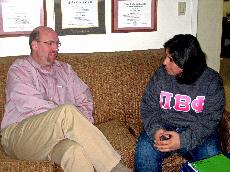Departments offer new course proposals for upcoming catalog

April 16, 2008
Professors from departments across campus are working hard to develop new courses for the 2009-2011 course catalog.
Every two years the course catalog is updated with revised majors and new courses. While classes can be added or dropped by a program at any time, years with new catalogs tend to bring the most proposals.
“Every department every year considers course changes,” John Bolen, registrar and associate dean, said. “Every time we have a catalog year all departments take that as an opportunity to begin looking at their curriculum and seeing if there is any way of improving it.”
Bolen said there are several reasons departments may choose to change their curriculum. First could be a change in the make-up of the faculty.
“The nature of the faculty in that department may change,” Bolen said. “We always want to make sure that we are offering courses that meet the expertise of the faculty.”
Changes in the field can have an impact on what classes a department offers, as can routine program reviews. Every five to seven years, each department undergoes an extensive review of their curriculum including what courses are being offered and how.
“In that review they have to literally go through their entire curriculum and look at the overall field and look at other colleges of our size and like and compare ourselves with what others are doing to make sure we’re providing the best possible for our students,” Bolen said.
During each review, the department brings in an evaluator from another school to oversee how things run. The Communications Department underwent one such review this year. The department is working towards making some changes as a result of this review, creating a multimedia-based curriculum.
According to Brian Steffen, professor of communication studies, faculty in the department have been working on the curriculum overhaul for some time.
“The whole process of this move towards converged or multi-media curriculum probably has been in the discussion phases among us for four to five years,” Steffen said. “What really accelerated things is when the administration of the college really got on board.”
Steffen said help from an outside evaluator gave the department more ideas of how to update the curriculum.
“The final pieces that came into the puzzle were earlier this year when we asked an outside adviser to come to campus and made a number of specific recommendations to us of things we could and should do to offer a communication curriculum for the 21st century as opposed to the 1980s,” Steffen said.
Another department making significant changes to its curriculum is the physical education department. Bob Nutgrass, professor of physical education, said changes are being made to help align the department’s majors with what’s going on across the country.
“For athletic training majors, we’re going to be dropping a chemistry requirement,” Nutgrass said. “The National Athletic Trainers Association does not require students to have chemistry, so we thought we could delete it.”
Nutgrass said the department is also planning on changing its name.
“We’re changing it to health and human sciences department instead of physical education because we put in the new exercise science major concentration,” Nutgrass said. “It depicts more what the department is about.”
The religion department is considering changes to their curriculum to allow students more flexibility.
“We’re trying to make the major and minor more flexible because we think that allows students to tailor a program,” Mark Gammon, assistant professor of religion, said. “This will provide more variety for all students.”
Gammon said the changes are also in light of changes to the faculty and their areas of expertise.
“The curriculum we had was fairly old,” Gammon said. “The discipline and the actual faculty we had had change completely.”
Although the new course catalog does not come out until fall of 2009, many of the changes will be implemented next semester.
Changes to different departments could mean that some classes will no longer be offered. Bolen said it’s important for students to realize that if a class they may have needed for a major has been deleted from the curriculum, other courses will have likely replaced it.
“If a student is in a major that is going to be affected by a course change then what will happen is there will be substitutions made for that course that is going away,” Bolen said. “If a change does affect a student then we will do everything we can to make sure the student can substitute that course so they can graduate. We’ve always been able to work things out.”




